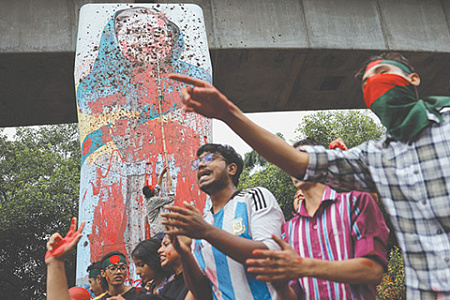
One year after a nationwide student-led uprising ousted Prime Minister Sheikh Hasina, Bangladesh has put its former leader on trial in absentia for crimes against humanity. Hasina, who fled to neighboring India following her government’s collapse, is being tried by a three-judge panel of the International Crimes Tribunal. New Delhi has so far ignored requests for her extradition, leaving the court to proceed without the main defendant.
The charges, which include aiding and abetting murder and torture, stem primarily from the violent crackdown on the 2024 protests, which saw over 1,400 people killed. The popular revolt, ultimately backed by the military, ended Hasina’s long tenure in power and led to the banning of her Awami League party. In a profound twist of irony, the very tribunal now judging her was established by Hasina herself in 2009 to prosecute war crimes from the country’s 1971 independence war. The investigation also covers her entire 15-year second term, with accusations of extrajudicial killings and the forced disappearances of political opponents, all of which she denies.
As the nation marks the anniversary of the revolution on August 5th, the interim government, led by Nobel Peace Prize laureate Muhammad Yunus, is grappling with a crisis of its own. Yunus, famed for his pioneering microcredit work, has found that his expertise in economic development has not been enough to solve the nation’s deep-seated problems. A year into his administration, many of the hopes that fueled the uprising remain unfulfilled, and the country is teetering on the edge of instability.
A severe breakdown in law and order has gripped Bangladesh. The flight of numerous police officers after Hasina’s ouster has decimated the force, leading to a dramatic spike in street crime, including robberies, kidnappings, and murders. Efforts to rebuild law enforcement have been slow, with many police stations remaining shuttered. This security vacuum is exacerbated by persistent high unemployment, which continues to fuel social unrest and criminal activity.
Furthermore, the political shift has allowed for the resurgence of Islamist groups that were suppressed under Hasina’s secular government. This has led to a rise in religious intolerance, with reports of Islamist factions attacking religious minorities such as Hindus and Christians, and disrupting events like women’s football matches. The new climate of fear threatens the social fabric of the nation.
The path forward is clouded by political gridlock. Yunus’s government has proposed major constitutional reforms, including prime ministerial term limits and a new bicameral parliament, but these plans are stalled. A deep rift has formed between the country’s main political forces over the timing of new elections. Yunus aims for April 2026, while the established Bangladesh Nationalist Party (BNP) is demanding snap elections this December.
This fractured political landscape is a battleground between the interim government, the BNP, resurgent Islamist forces, and the new National Civic Party (NCP), born from the student protest movement. With each faction focused more on rallying public support than on finding common ground, the prospects for meaningful reform appear bleak. As the key players vie for power, the vision of a stable, prosperous “new Bangladesh” that inspired a revolution is in danger of being lost in a mire of political infighting.
